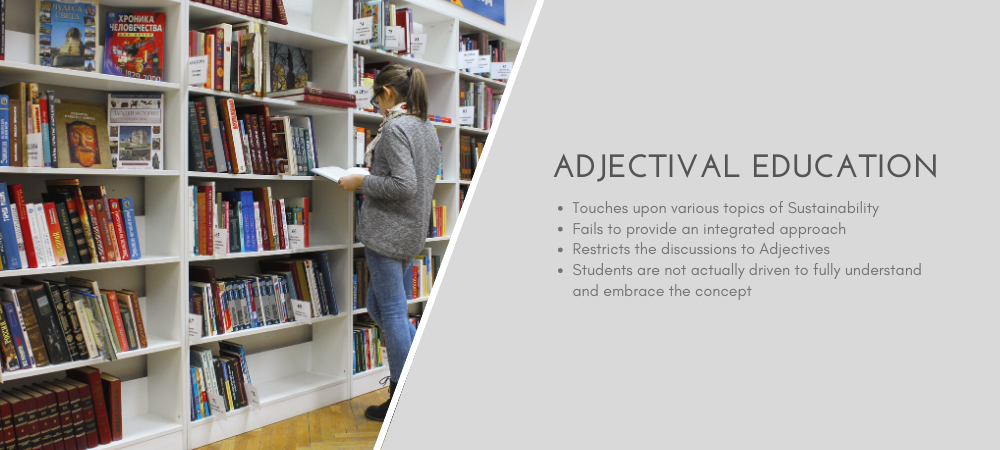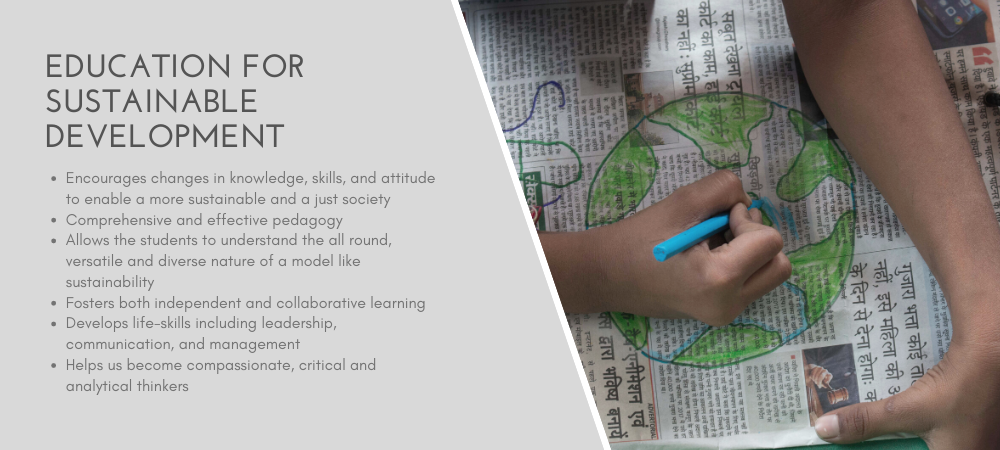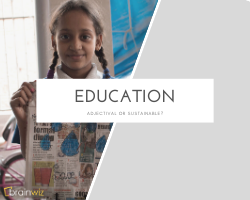In today’s world, a lot of concerns have been raised regarding the unsustainable means of development. Sustainability is something that we must receive education for and implement at the grass-root level. It is imperative that we understand the nature and importance of sustainability right from the beginning and therefore schools must inculcate practical and integrated learning about sustainable development in the daily course of education.
Explaining a Concept vs Integrated Approach
In our previous blog, we have already covered that Adjectival Education touches upon various topics of sustainability but it fails to provide an integrated approach that can lead to a mindset and behavioral change among the learners to adopt sustainable living practices. In contrast, Education for Sustainable Development is an approach to education and a key enabler that encourages changes in knowledge, skills, and attitude to enable a more sustainable and just society for all. It aims to empower and equip the current and future generations to understand the importance of sustainability and the call for balanced and appropriate measures to approach the problem that the international community faces today. Sustainable Development is something that requires an integrated approach, social, economic, and political, and must not be neglected or ignored.

Theoretical Knowledge vs Practical Implementation
Education for Sustainable Development is a much more comprehensive and effective pedagogy than Adjectival Education. While ESD opens a platform for students to have in-depth discussions about sustainability and practically implement the measures they discuss, Adjectival Education restricts the discussions as even though you add adjectives like ‘hunger’ and ‘poverty’ it does not give you the necessary information for the implementation and actions we can take in our daily lives. It fails to deliver the importance of sustainability in a way that students are actually driven to fully understand and embrace the concept. In this form of education, the main axis of teaching does not become sustainability but stays the original concept of the lesson you are teaching and hence the students use it as a method to educate themselves about classroom concepts rather than real-world sustainability issues. It also restricts the teacher from delving much into the topic as their main focus remains the concept they are teaching and not ‘hunger’ or ‘poverty’. Moreover, subjects like Economics provide a very objective lens while Social Science provides a contrasting one. No subject alone can provide the integrated approach required for educating students about a multifaceted topic like sustainability.
Hence, ESD proves to be a much more effective and constructive method of teaching as it allows the students to understand the all-round, versatile and diverse nature of a model like sustainability.

ESD for Life Skills
Education for Sustainable Development (ESD) is diverse mulling on topics that affect the global community and enhancing the minds of the learners by allowing them to understand how unsustainable development negatively affects the environment and then moving on to comprehend why there is an urgent need to achieve sustainability. A part of the challenge of ESD is having a coherent plan to use a variety of techniques to achieve learning goals. For Example, fostering both independent and collaborative learning as well as teaching the content of the mandated syllabus. Using storytelling and combining teacher-centered and learner-centered approaches to encourage participatory learning and high order thinking skill set.
We do not only need Education for Sustainable Development to be environmentally-friendly; but because it involves developing life-skills including leadership, communication, and management; all of which are extremely important for personal development as well. It helps us to grow as individuals and work on our personality and betterment. It helps us become compassionate, critical and analytical thinkers that are much needed in the world that we live in today adding values to ourselves that is the kernel for personality development. Adjectival Education allows us to mostly theoretic study Sustainable Development. We barely carry back the lesson with ourselves from the classroom and apply it to our lives. It mainly involves knowing about the issue but it is very little about how we can solve these issues at a personal level because we tend to believe that everything is done at higher levels where students have no role to play. ESD, on the other hand, helps us understand the problem along with motivating us to implement the solutions at our individual levels. Through ESD, we get to see the practical side of the problems and understand actions we must take in order to prevent or reduce problems like hunger, need for clean water and sanitation and lack of quality education.
The need to learn about sustainability in the world is growing at a relatively swift pace and the dire need to implement its principles no matter what discipline or career you choose is unavoidable. Hence, it is imperative to teach and learn sustainability aspects right in the classrooms. Get in touch with Brainwiz if you wish to know how we are taking SDGs to every classroom.


